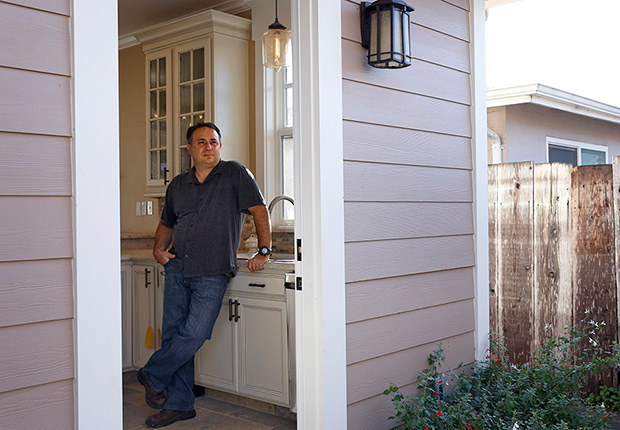AARP Hearing Center

By Laura Mecoy
Michael Achkar thought he had the perfect solution when he built a small house for his father in the backyard of his Capitola home.
Then Achkar encountered one of the many challenges Californians face as the state seeks to expand housing: Connecting the separate unit to a water supply would cost more than $24,000 for fees and the installation of a new meter—requirements of his local water district, which has serious supply issues.
Because of the high cost, Achkar, 50, said his father is living at a memory care facility, instead of in the one-bedroom cottage with kitchen, office and fireplace.
“It’s just ridiculous,” Achkar said. “You can build a 10,000-square-foot addition to your house and have multiple families living in it, and there are no additional hookup fees. But when you build a separate unit, they charge more.”
Clearing away the obstacles to creating more affordable housing continues to be one of AARP California’s top legislative priorities this year. It also plans to focus on increasing the availability of housing and improving transportation and land use to create age-friendly, livable communities.
The other priorities are helping family caregivers, improving access to health care, ensuring greater financial resiliency, and providing accessible and safe technology.
“Our goal is to help people live their best lives,” said Nancy McPherson, AARP California state director. “We are focused on people 50-plus and their families, which basically includes everyone in the state. That’s why we’re addressing issues that are important to people at all stages of life.”
Obstacles to new dwellings
Creating new housing is a priority in a state where renters pay an average of 50 percent more than they would in other states. A recent state report documented the obstacles to adding housing and included regulatory barriers, like those Achkar and others who built accessory dwelling units (ADUs) encountered. Sen. Bob Wieckowski, (D), author of two new laws to remove some of these obstacles, said more may need to be done to create more ADUs.

“ADUs are an important part of the solution to our affordable housing shortage,” he said. “ADUs can provide additional workforce housing, keep families together and let seniors age in place at no cost to taxpayers.”
Achkar’s unit is new construction, not a conversion, so the new laws don’t exempt it from water hookup fees.
Ron Duncan, Soquel Creek Water District general manager, said Achkar has to pay the same fees as others do for new construction, including $9,075 for “offsets,” or water-savings measures elsewhere, because of the district’s water shortage.
“The offsets help ensure people seven generations down the road will have the opportunity to live here and have water,” Duncan said.
AARP California is working with a broad coalition to improve long-term care services with a “no wrong door” approach so people can get assistance no matter where they enter in the system, she said.
The coalition is also focused on expanding long-term care insurance, because only about 5 percent of Californians have it.
To strengthen residents’ financial resiliency, AARP California plans to advocate for implementation of Secure Choice, a retirement program for workers who lack one, which AARP supported when it was enacted in 2016.
Secure Choice will require employers with five or more workers to offer a retirement savings plan or automatically enroll employees in the new state-created plan.
The program needs federal waivers for it to be launched in 2019, however, and congressional action has created doubt about the waivers.
AARP California also plans to ensure that technological advances, such as driverless vehicles, are safe and accessible to all state residents. McPherson said such advances could be “game-changers” for people as they age.
Laura Mecoy is a writer living in Los Angeles.































































